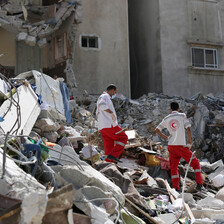The Electronic Intifada 31 December 2019

Al-Nada Towers were destroyed during Israel’s 2014 attack on Gaza.
APA imagesThe people of al-Nada Towers are still waiting for their homes to be rebuilt.
In July 2014, Israel attacked these apartment blocks in the northern Gaza city of Beit Lahiya from both the air and the ground.
More than five years later, numerous families who lost their homes during that assault are struggling to make ends meet.
Following their displacement, the residents of al-Nada Towers received assistance to pay rent on temporary accommodation from UNRWA, the UN agency for Palestine refugees. Yet because of a funding crisis, these payments were halted during 2018.
The crisis was triggered when Donald Trump, the US president, imposed major aid cuts on UNRWA. The cuts were a prelude to the US announcement that it would cease funding the agency completely.
“Nowhere to go”
Muhammad Abu Nahel is among the former residents of al-Nada Towers who have suffered due to Trump’s decisions.
Abu Nahel was evicted from his temporary apartment late one evening in March this year.
He had been unable to pay his landlord rent for nine months, running up almost $1,200 in arrears.
“I had nowhere to go,” he said. “I was very stressed.”
Before being evicted, Abu Nahel worked in a shop repairing punctured tires. His income was insufficient to meet his family’s needs.
“Sometimes I didn’t have enough money for us to have a meal together at the weekend,” he said.
Abu Nahel has managed to find accommodation in Tal al-Zaatar, another part of northern Gaza.
UNRWA has employed him as a security guard in a Beit Lahiya school. His contract lasts for six months and he has not been told if it will be renewed after that period.
He is paid $300 per month. “Sometimes I cannot afford the cost of the journey to work,” he said.
Adnan Abu Hasna, a spokesperson for UNRWA, said that the agency is “doing what we can” to assist people who used to live in al-Nada Towers.
It has established a special program so that those affected by aid cuts are provided with employment.
“UNRWA’s financial situation is critical at the moment,” said Abu Hasna. “It is not guaranteed that we will be able to continue the jobs program.”
The agency has described its deficit as the worst in its seven-decade history, stating that it needs nearly $167 million by the end of 2019.
“Desperate conditions”
Abd al-Hafeedh Abu Salem is also a former resident of al-Nada Towers. He now lives in his uncle’s home, having been evicted from an apartment earlier this year.
He owed his landlord approximately $1,100 in rent.
Abu Salem has three daughters attending university. As he has been unable to pay their tuition fees, he owes the colleges in which they are studying a total of around $1,400.
He and his family live in an extension to his uncle’s home that is still under construction.
As the walls of the extension have not been finished, Abu Salem has used tarpaulin to try and protect his family from the elements.
“What have my children done wrong?” he said. “Why do they have to live in such desperate conditions?”
Many who were attacked by Israel during its major 2014 offensive have not received any financial assistance for repairing their homes.

People still waiting for aid to rebuild homes damaged five years ago have held protests outside buildings used by UNRWA.
APA imagesUNRWA’s financial problems have left it unable to help some 52,000 people whose homes were categorized as “partially damaged.”
Some of those who have not yet received aid have protested lately outside UNRWA’s headquarters in Gaza City.
Samir al-Aloul lives near al-Safa mosque, which Israel destroyed in 2014. His home in al-Bureij refugee camp was damaged during the attack on the mosque.
As a result, water continues to leak through his ceiling when it rains.
“The roof was cracked and I still have not been able to repair it,” he said. “We are still waiting for compensation. We often hear that compensation will be paid but so far nothing has happened.”
Rami Almeghari is a journalist and university lecturer based in the Gaza Strip.




